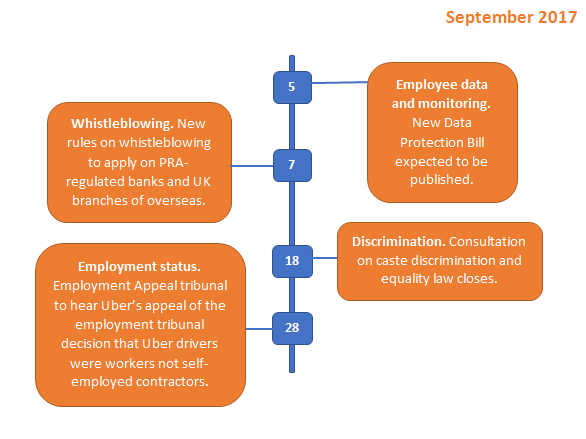As the Summer comes to a close, the promised first data from the audit of racial disparities in public services is still awaited. This month, a survey conducted by the TUC has suggested that white workers earn an average of 8.3% more than their black counterparts despite holding the same educational qualifications and the Equality and Human Rights Commission published a strategy on gender, ethnicity and disability pay gaps. The strategy includes a recommendation to extend mandatory gender pay gap reporting to ethnicity and disability.
Following last month’s momentous Supreme Court decision on employment tribunal fees, we have published a new Practice note, Q&A: Practical issues arising from the abolition of fees in the employment tribunal. The note deals with frequently asked questions in response to the decision.
Working time and time off. Advocate General Sharpston has given an opinion on whether time spent on “stand-by” duty is working time. It is for member states to determine whether the quality of time spent on stand-by duty is undermined to such a degree by any restrictions imposed by the employer that it should be classified as working time.
The EAT has clarified that voluntary overtime, standby allowances and call-out payments count towards holiday pay if sufficiently regular. This decision follows the now well-established direction of travel for holiday pay cases, highlighting that voluntary elements of work are in principle to be treated no differently, for holiday pay purposes, than compulsory non-guaranteed overtime dealt with in Bear Scotland. However, some uncertainty does remain. The question of whether a payment is “normal” is a question of fact and degree for a tribunal, which means employers will need to take a view on how they treat borderline cases.
Discrimination. The EAT has held that claimants do not bear the initial burden of proof in discrimination cases. It is for the tribunal to consider all the evidence, not just from the claimant but from all sources, to decide whether there are facts from which it can conclude that discrimination has occurred. The impact of the decision will be far-reaching as it changes the long-established burden of proof principles set out in Barton v Investec and Igen v Wong.
The EAT has also held that no indirect discrimination occurred when a prison disciplined a prison chapel volunteer for quoting Bible passages that caused offence to some people in the congregation. Following an investigation, the quotes in context, were concluded to be homophobic. The claimant’s argument that the employment tribunal had erred in requiring him to show group disadvantage was rejected. Group disadvantage is a clear requirement of indirect religion or belief discrimination under section 19 of the Equality Act 2010 (EqA 2010), notwithstanding the potential incompatibility with Article 9 of the European Convention on Human Rights.
Employment tribunals. The EAT has held that tribunals have the power to appoint a litigation friend for a party who lacks capacity to conduct proceedings, and has provided broad guidance on the appointment of litigation friends. However, tribunals should only investigate a party’s mental capacity when there is clear supporting evidence. The EAT has also clarified that tribunals should inform all parties when a witness order is made.
Following consultation, Presidential Guidance and Principles on calculating pension loss have been published together with a response to the consultation. The Guidance and Principles took effect on 10 August 2017.
Employee data and monitoring. The government has published a statement of intent on the planned Data Protection Bill. The Bill will repeal the Data Protection Act 1998 and incorporate the EU General Data Protection Regulation into UK Law. The Bill is planned to be published after 5 September 2017 when Parliament returns after the Summer recess.
Employment status. In another decision on employment status in the “gig economy” an employment tribunal has held that a cycle courier working for Addison Lee was a worker and not a genuinely self-employed independent contractor.
Equal pay. The EAT has clarified the interplay between the equal pay and discrimination provisions of the EqA 2010 and held that an employer’s breach of the implied sex equality clause could constitute a constructive dismissal, but could not form the basis of a separate sex discrimination claim.
In other news, the Director of Labour Market Enforcement called on the government to improve funding for minimum wage enforcement, Sir Philip Hampton attributed the gender pay gap at the BBC in part to a lack of ambition on the part of female staff, the charity Mind published results of a survey suggesting men are twice as likely to have mental health problems at work compared to women, the Government Equalities Office has published a report calling for new measures to accommodate menopausal women at work and analysis by the Guardian has suggested that the gender pay gap has widened in one in four government bodies in the last decade.
In our blog, Elaine McIlroy looked at enforcing restrictive covenants in Scotland, Marian Derham, Sarah Verrecchia and James Brown analysed redundancy dismissals: fairness should always be judged in the same way, David Rushmere and Laura Webb analysed the implications of the Supreme Court Judgment on ET fees: an-in-house point of view, Talia Barsam looked at uplifts: where to next? in light of the Court of Appeal’s decision in Pereira de Souza v Vinci Construction Ltd [2017] EWCA Civ 879, and Marianne Tutin examined whistleblowing protection: a fluid approach.
Next month
Key developments to look out for in September 2017.

How to stay up to date
Practical Law Employment has a number of tools to help keep you updated on anticipated developments in employment law:
- What to expect in employment law has details of forthcoming legislative and case law developments.
- Employment legislation tracker contains information on the progress of government consultations, bills and legislation.
- Case tracker tracks key forthcoming cases and recent judgments currently making their way through the courts.
- Key dates calendar enables you to browse by month or search by what’s coming up by date range.



